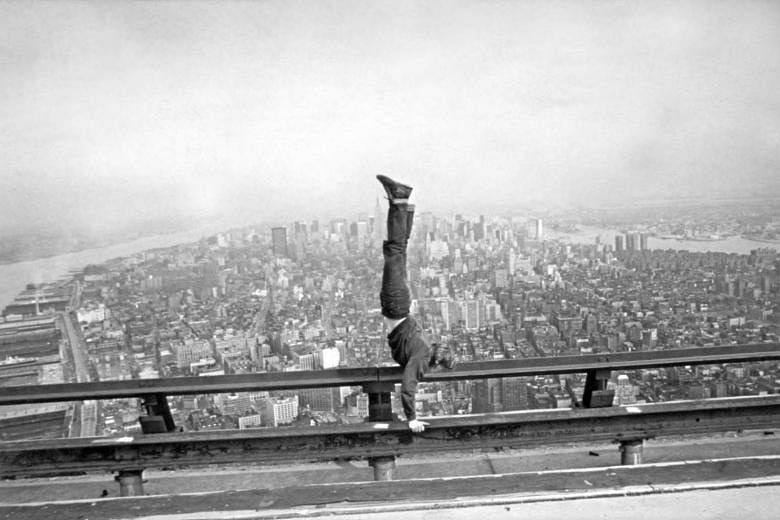This story was first published in The Straits Times Life! on April 6, 2003.
EVEN after nearly 30 years of living in the United States, Philippe Petit speaks with a French accent. His English, though fluent, has a slightly odd syntax.
But that has not marred his absorbing and poetic memoir, To Reach The Clouds, which has just hit bookshops here.
It tells of his famous wire walk between the Twin Towers in 1974. The then-25-year-old, with the help of friends, had broken into the newly-built World Trade Center.
Using a bow and arrow, they fired a line to bridge the 60 m gap between the towers and spent the night rigging up.
At 7am on the morning of Aug 7, New Yorkers woke up to the astonishing sight of this daredevil Frenchman dancing across the skies.
As he tells Life! over the telephone from upstate New York: 'The first step, ungluing myself from the building, was the most vivid moment of the walk. And then meeting that bird above me was something very out of this world.'
A curious bird had hovered above him when he was lying flat on the wire.
Petit held court in the air, 110 storeys above the ground, for an hour, without any safety nets. While some might think terror would be a natural state of mind, the 58-year-old says: 'No, no. I feel the opposite of that sentiment. I feel attraction to where I am, I feel elation at being here, I feel joy.'
Those were not the same sentiments felt by the New York Police Department, who arrested Petit the instant he stepped off the wire. But he was immediately the most famous man in the country.
The next day, Richard Nixon became the first American president to resign from office and he told reporters on the White House lawn: 'I wish I had the publicity that Frenchman had.'
NO PUBLICITY HOUND
WHILE cynics may dismiss Petit as a publicity hungry daredevil, a chat over the phone soon dispels the notion.
Engagingly quixotic - yes. Single-minded to the point of myopia - perhaps. But a mere publicity hound - no.
This is evident when he discusses the terrorist attacks on Sept 11, 2001, which he saw on television.
He says haltingly: 'I had married my life with these towers, they were a live ingredient in my being. I felt something was taken away from me.
'But I could not really share that feeling because of all the people that were dead that day. It would sound very strange if I were to talk about my love of my towers.'
His book was published in the United States last September, coinciding with the anniversary of 911.
'It's a very delicate thing to talk about. On one hand, I felt a personal love. On the other hand, there was a love much more important than losing the two towers, it was losing thousands of lives.'
There is a disarming childlike frankness in his conversation. He admits: 'I don't have money in the bank.'
He still has an apartment in Paris, but it is, literally, a broom closet. He could have made a fortune after his WTC walk - Hollywood wanted a movie, publishers wanted a book, Burger King wanted him to dress as a Whopper and wire-walk across 8th Avenue. But he turned them all down.
He says earnestly: 'The money would have forced me to change my philosophy, or change my view of what I was doing. What I do pertains to a beautiful feel, a pure feel. If I start entering onto the wire with a Coca-Cola T-shirt, it would not be a wire anymore for me. It would be some way to get easy money and somehow it would not be beautiful.'
He scrapes a living as a performer of juggling and magic, and he teaches creativity and gives workshops.
Now, his walks are no longer illegal, but spectacular performances done at the request of cities and governments.
In 1989, to celebrate the French Republic's bicentennial, he executed a 700 m inclined walk up to the second level of the Eiffel Tower. In 1994, Frankfurt invited him to perform for the city's 1,200th anniversary.
While most associate wire-walking with the circus, what Petit does is different. In the circus, wire walkers do the same thing every night, across the same distance, in an enclosed environment.
Petit's walks are conducted outdoors, on and between, different structures. His first illegal 'coup' was in 1971, between the towers of Paris' famous Notre Dame cathedral. In 1973, he stopped morning traffic on the Sydney Harbour Bridge when he walked between its northern pylons.
Each walk demands meticulous planning and sophisticated engineering solutions. The steel cable needs to be strung to a tension of several tons, and secured at vital points by guyropes or cavaletti.
The man, who has been arrested more than 500 times, says: 'For me the wire, the piece of cable, is actually a stage on which I perform some kind of theatre in the clouds.'
ON THE EDGE
IF HE had been born in a circus, he muses, he might not have approached wire-walking like this. The self-taught wire walker says with no hint of arrogance: 'But I was not born in the circus. So I reinvented the art of wire walking and I practised it by intuition as a man of theatre.'
The son of a homemaker and a fighter pilot started climbing at four and picked up magic tricks at six. Disinterested in studies, he was expelled from five schools by the time he was 17. His parents despaired and legally emancipated him that year.
You can almost see the typically Gallic shrug of the shoulders as Petit says: 'They didn't accept, or did not understand, my vocation was that of a troubadour and a poet.
'I understand in some ways they were afraid of the absolute way of thinking that I had, and my disregard for certain conventions. So they thought, Our son is going to become a bank robber or a criminal.'
He chuckles at the idea and adds: 'Throughout the main course of my life, I never had a good relationship with my parents.'
It is only recently that he has become friends with his father.
Petit, a bachelor, is happy with his myriad projects, including playing chess, drawing, writing, and rebuilding a barn near Woodstock, New York. This last project, using only 18th century tools, has occupied him for the past 10 years.
He has taken the same amount of time with his current 'work in progress' - an attempt to wire-walk across the Grand Canyon. He got US$1 million (S$1.73 million) from sponsors and producers, and the project came close to fruition a couple of times before funding fell through.
He says wryly: 'I have worked on it so much it is almost as if I have done it.'
He is not about to give up on the idea: 'I think it will happen one day.'
In the meantime, his passion for living bubbles over: 'Imagine a tempest or imagine a pot with boiling water in it. That's what a day is for me. I have too many things to do. When I wake up, already the day is too short.
'I feel like I gallop, I run through life.'
Spoken like a true hard-living artiste.
Philippe Petit's To Reach The Clouds: My High Wire Walk Between The Twin Towers (Faber & Faber), priced at $29.64, is available at all major bookshops.




